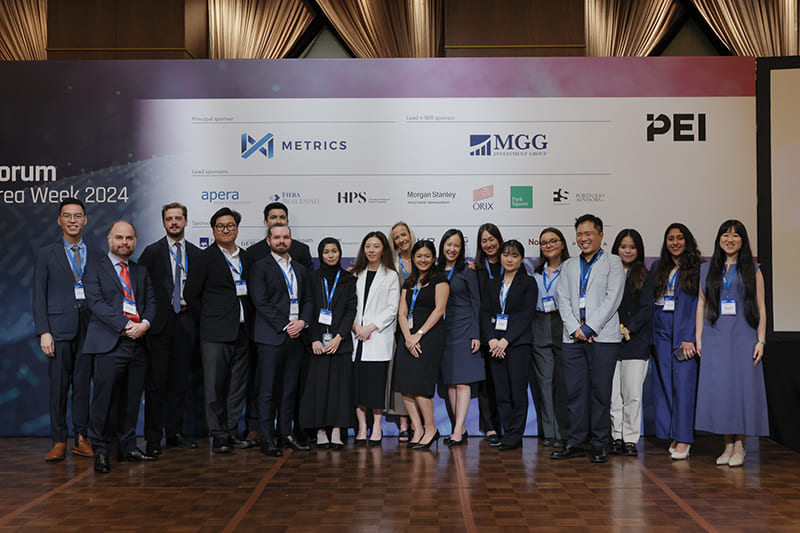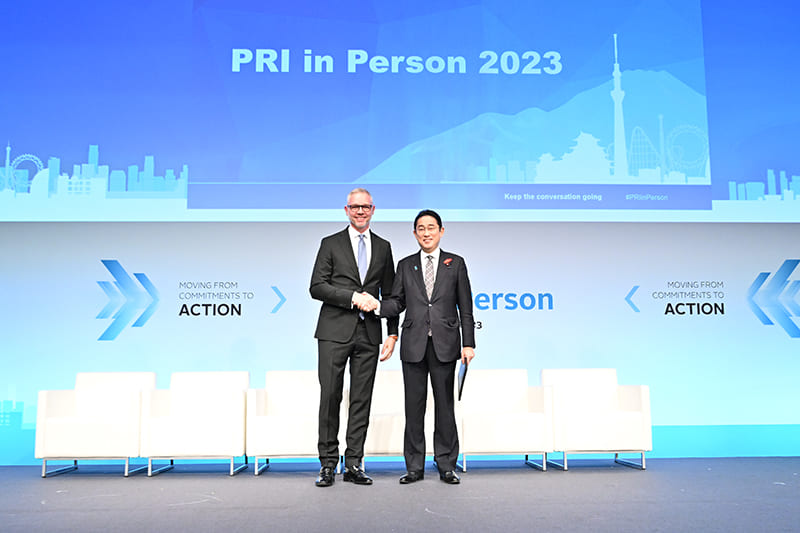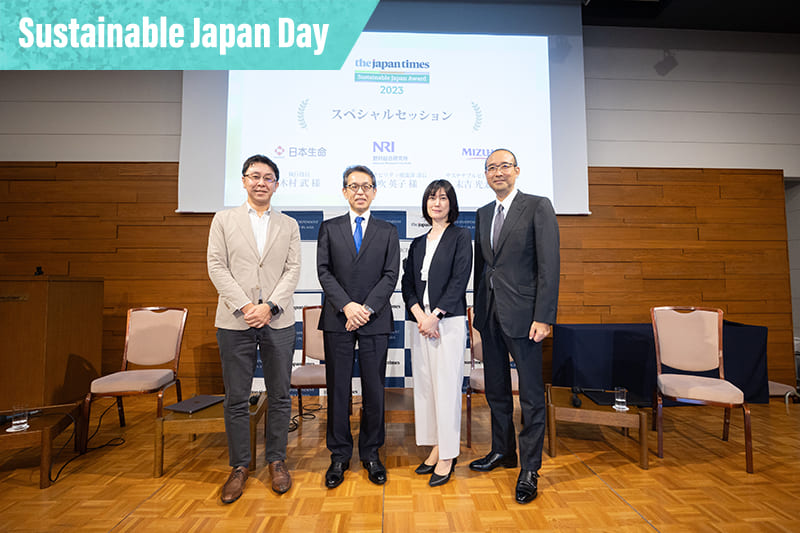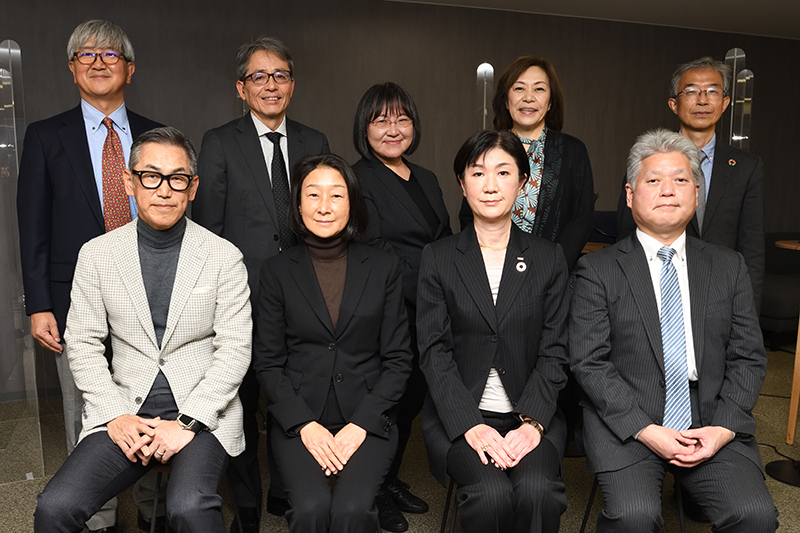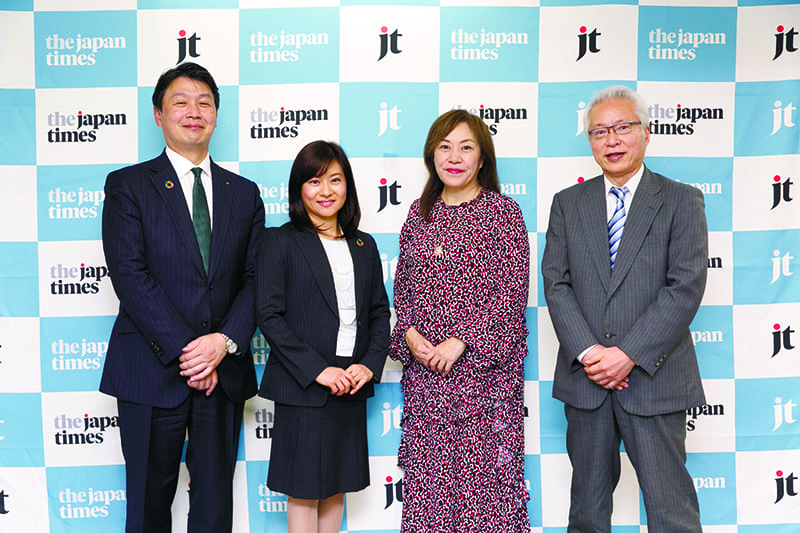October 02, 2023
Event: Responsible investment under capitalism
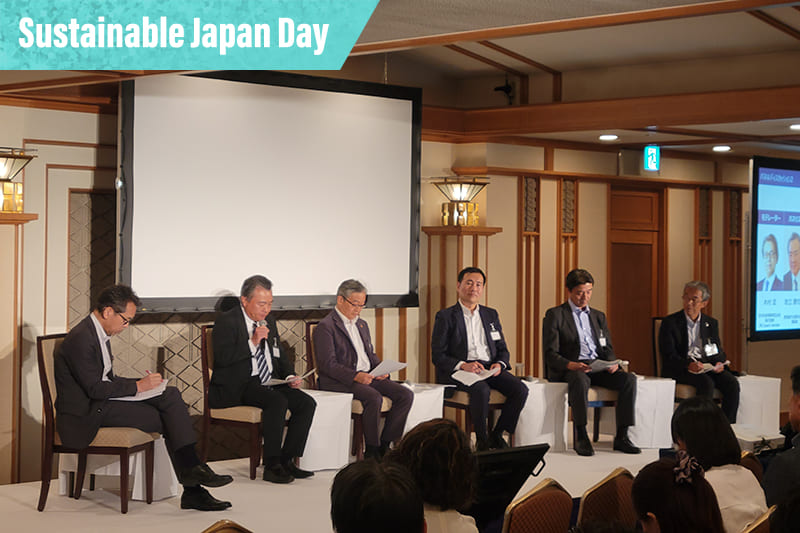
As the role of institutional investors in creating a sustainable society becomes more important than ever, investment experts gathered on Sept. 6 to discuss how to support companies in achieving their ESG (environmental, social and governance) goals.
The event, “Responsible Investment Under Stakeholder Capitalism,” was an official side event for PRI in Person 2023, to be held in Tokyo on Oct. 3 to 5. PRI in Person is an annual conference by Principles for Responsible Investment, a U.N.-backed network of institutional investors that take ESG factors into account.
The event was sponsored by Nippon Life Insurance Co., the lead sponsor for PRI in Person 2023, where over 1,000 delegates are expected to attend, with asset owners, investment managers and policymakers discussing ESG issues and sharing the latest developments.
It kicked off with a keynote speech by PRI Chair Martin Skancke, who underlined the importance of institutional investors’ alliance to solve societal issues in our rapidly and unprecedentedly changing world. “It’s more important than ever that responsible investors are equipped to navigate the road ahead while ensuring that they remain focused on their fiduciary responsibility to deliver the best possible outcomes for their clients,” he said in a video message.
PRI, formed in 2006 as a small group, now has nearly 5,500 signatories around the world, representing more than $120 trillion in assets under management. “We are better placed than ever to help deliver the benefits of responsible investment practice to our industry,” he said.
The speech was followed by a panel discussion on institutional investors’ engagement with investee companies to achieve a sustainable society.
At the start of the discussion, Noriaki Kurose, president and representative director for Schroder Investment Management (Japan) Ltd., explained how the firm evaluates corporate activities for ESG issues. Since financial statements do not show this information, no single measurement can properly assess it. “That is why it is significant to make analysis based on data and facts, and make it transparent,” he said.
Schroder developed its own tools such as SustainEx, which quantifies the positive and negative impacts that companies have on environmental and social issues, and ActiveIQ, which enables them to track milestones of their engagement activities.
Masaaki Amma, executive adviser for the Social Innovation and Investment Foundation, echoed that, saying such measurements to financially examine corporate impacts will become more important. He added that efforts are being made in the accounting field by developing “impact-weighted accounts” (IWAs), a way for companies to quantify their positive and negative impacts on the environment and society and disclose them in their financial accounting. A framework released by an initiative led by Harvard Business School and others proposed in 2022 how corporate financial statements could be supplemented by monetized measures of impacts.
“It is necessary for companies to understand and manage not only a small part of their impacts, but a variety of positive and negative impacts to develop business strategies,” he said. Otherwise, investors would see that the companies cherry-picked their impacts.
Amma also said corporations are required not only to wield positive impacts on society but to transform those into their own resources — human capital, value chains and value-creating processes — to improve their cash flow and corporate value.
Teppei Yamaga, head of the net-zero strategy department at Nomura Asset Management Co., explained how companies can manage greenhouse gas emissions while actively developing their business. One solution is to introduce a wider range of indexes to evaluate their contributions to the environment, he said. Among many other indexes, what Nomura Asset focuses on is “avoided emissions,” meaning emissions that are reduced outside of a product’s value chain, caused as a result of the use of that product.
“If sales of decarbonizing products increase, so do avoided emissions. That means the index basically has a positive correlation with corporate value and sales,” he said.
Kaori Miyake, director for the ESG planning and promotion department at Sumitomo Mitsui Trust Bank and co-chair of the Japan Climate Leaders’ Partnership, a coalition of companies committed to climate action, talked about Japan’s issues in the global investment industry.
She said Japanese firms often only focus on a goal of net-zero emissions in 2050. But they need to disclose what they can do in the near term while discussing short-, medium- and long-term goals. They need to have accountability for their goals and progress, and also transparent processes, she said. She also said they need to confirm that their responsibility in developed countries differs from that in developing parts of the world.
The second half of the event focused on the importance of asset owners’ and managers’ engagement with their beneficiaries and clients to reflect their sustainability preferences.
Nathan Fabian, PRI’s chief sustainable systems officer, said in a keynote speech: “Sustainability challenges will present many difficult choices for investors, for us investing the money of our beneficiaries, and frankly we need the guidance and support and contribution of our beneficiaries on their preferences to help us answer these challenging questions.”
Hiroshi Nakaso, chairman of the Daiwa Institute of Research and a former Bank of Japan deputy governor, listed three important points about what asset owners, especially pension funds, can aim for when they engage with their beneficiaries: meaningful dialogue with beneficiaries, consistency with their parent companies’ policies, and digital innovation in asset management.
In the panel discussion, three institutional investors explained their engagement activities with their beneficiaries and clients.
Yasunari Iwadate, head of Higo Bank Pension Fund, and Junichi Tanaka, general manager in charge of responsible investment for Sumitomo Life Insurance Co., each illustrated how they work on engagement with their beneficiaries.
Tanaka said what is important for the insurer’s engagement is listening to as many stakeholder voices as possible, gaining a long-term perspective, and making a comprehensive judgment of what is in the overall long-term interest of their beneficiaries.
Global investment manager BlackRock, for one, has taken a new step to empower its clients. In 2022, it started Voting Choice services for its U.S. and U.K. institutional clients by providing four options for their proxy voting: controlling their own voting, taking a hybrid approach, choosing from third-party proxy advisers’ policies, and relying on BlackRock’s judgment for all voting decisions, said Akitsugu Era, managing director and head of investment stewardship in BlackRock Japan. BlackRock currently has about $9.4 trillion in assets under management around the world, of which eligible client investments are worth about $2.3 trillion.
Providing various voting options for clients is becoming more important at a time when their standpoints related to environmental and societal issues vary in the changing global situations. “In terms of fiduciary duty, we believe it is becoming very important to extend proxy voting options,” he said.
Hideki Takada, director at the Financial Services Agency, said institutional investors, including asset owners, must consider the best interests of their clients, but at the same time emphasized the importance of financial education in Japan, where most household financial assets — worth a total of ¥2 quadrillion ($13.6 trillion) — stay as bank deposits. “Many Japanese people are potentially interested in ESG issues, but when it comes down to investment, it is still hard for them to decide what to invest in,” Takada said.
Takeshi Mizuguchi, professor and president at Takasaki City University of Economics, asked the audience what beneficiary engagement really means. “To think about what beneficiary engagement means is equal to thinking about what capitalism is, or for whom capitalism exists,” he said.
Mizuguchi said this is a big turning point in history because the reason why new concepts for capitalism, such as stakeholder capitalism and sustainability capitalism, are emerging is that there is growing momentum in the world for the idea that we must do something about capitalism after it caused various harmful effects to the Earth, such as global warming and problems of human capital.
The important point, therefore, is for each beneficiary to win back capitalism, and to do so, they need resources as well as financial literacy, Mizuguchi continued. One possible solution is for financial service providers to show their clients guidance to help them understand that their best interests lie not in maximizing financial returns alone but in considering their sustainable impacts and outcomes for society in the long term, Mizuguchi said.

